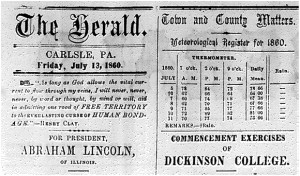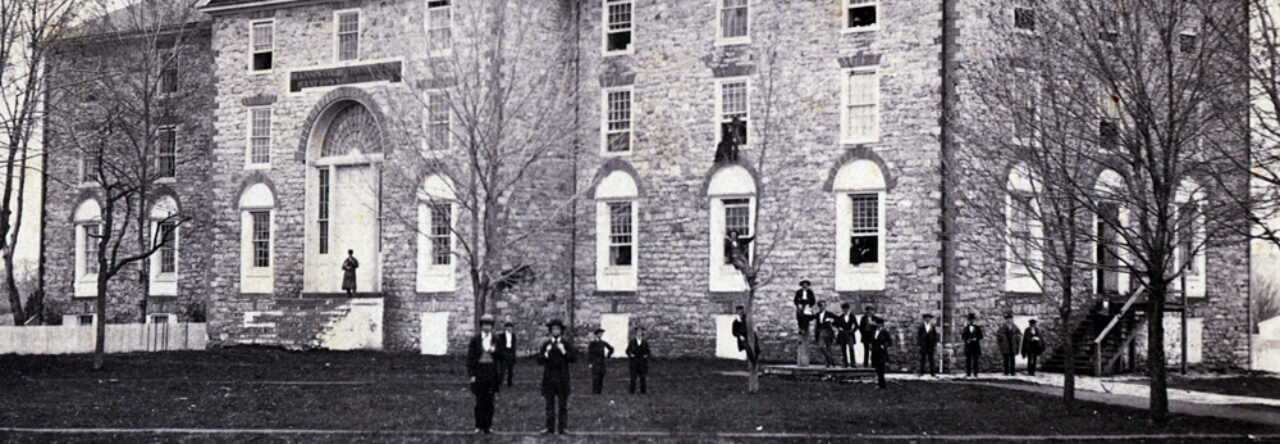 Dickinson College‘s 1860 commencement exercises occurred on Saturday evening, July 7, 1860. Two local papers’ contrasting reports on the evening demonstrate the partisan nature of nineteenth century newspapers. The Carlisle paper, The Herald, founded by Ekuries Beatty in 1799 originally supported the Whig party, but by 1860 printed articles with a strong Republican bias. In contrast the American Volunteer (another Carlisle paper) founded by William B. and James Underwood in 1814, reported the Democrat Party’s view of the news. The Volunteer charged Dickinson’s commencement speakers with attacking the “vulnerable” democratic president James Buchanan, himself a Dickinson alum from “when the institution was worthy of the name of a college.” According to the Volunteer many of the commencement speeches were full of dangerous “Abolitionist preaching” which must “be stopped.” Mr. George A. Coffey, of Philadelphia, spoke at an alumni gathering on the Wednesday before commencement and particularly offended the writers of the Volunteer who labeled his speech as “fierce and outrageous.” While the Herald admitted that Mr. Coffey introduced “topics which were offensive to many in the audience,” the paper concluded “it was a masterly speech.” Overall, the Herald presented a very different picture of the commencement exercises, carefully listing the names of the student speakers followed by a brief, usually complimentary, analysis of their speeches. The two Carlisle papers’ distinctly partisan accounts of Dickinson’s 1860 commencement reflect the political spin of the press throughout the Civil War era.
Dickinson College‘s 1860 commencement exercises occurred on Saturday evening, July 7, 1860. Two local papers’ contrasting reports on the evening demonstrate the partisan nature of nineteenth century newspapers. The Carlisle paper, The Herald, founded by Ekuries Beatty in 1799 originally supported the Whig party, but by 1860 printed articles with a strong Republican bias. In contrast the American Volunteer (another Carlisle paper) founded by William B. and James Underwood in 1814, reported the Democrat Party’s view of the news. The Volunteer charged Dickinson’s commencement speakers with attacking the “vulnerable” democratic president James Buchanan, himself a Dickinson alum from “when the institution was worthy of the name of a college.” According to the Volunteer many of the commencement speeches were full of dangerous “Abolitionist preaching” which must “be stopped.” Mr. George A. Coffey, of Philadelphia, spoke at an alumni gathering on the Wednesday before commencement and particularly offended the writers of the Volunteer who labeled his speech as “fierce and outrageous.” While the Herald admitted that Mr. Coffey introduced “topics which were offensive to many in the audience,” the paper concluded “it was a masterly speech.” Overall, the Herald presented a very different picture of the commencement exercises, carefully listing the names of the student speakers followed by a brief, usually complimentary, analysis of their speeches. The two Carlisle papers’ distinctly partisan accounts of Dickinson’s 1860 commencement reflect the political spin of the press throughout the Civil War era.
For modern scholarship on the subject of partisanship and the press see David T. Z. Minchin’s Just the Facts: How “Objectivity” Came to Define American Journalism (1998). The Library of Congress also provides an online newspaper directory to find more information on newspapers from across the country.

Leave a Reply